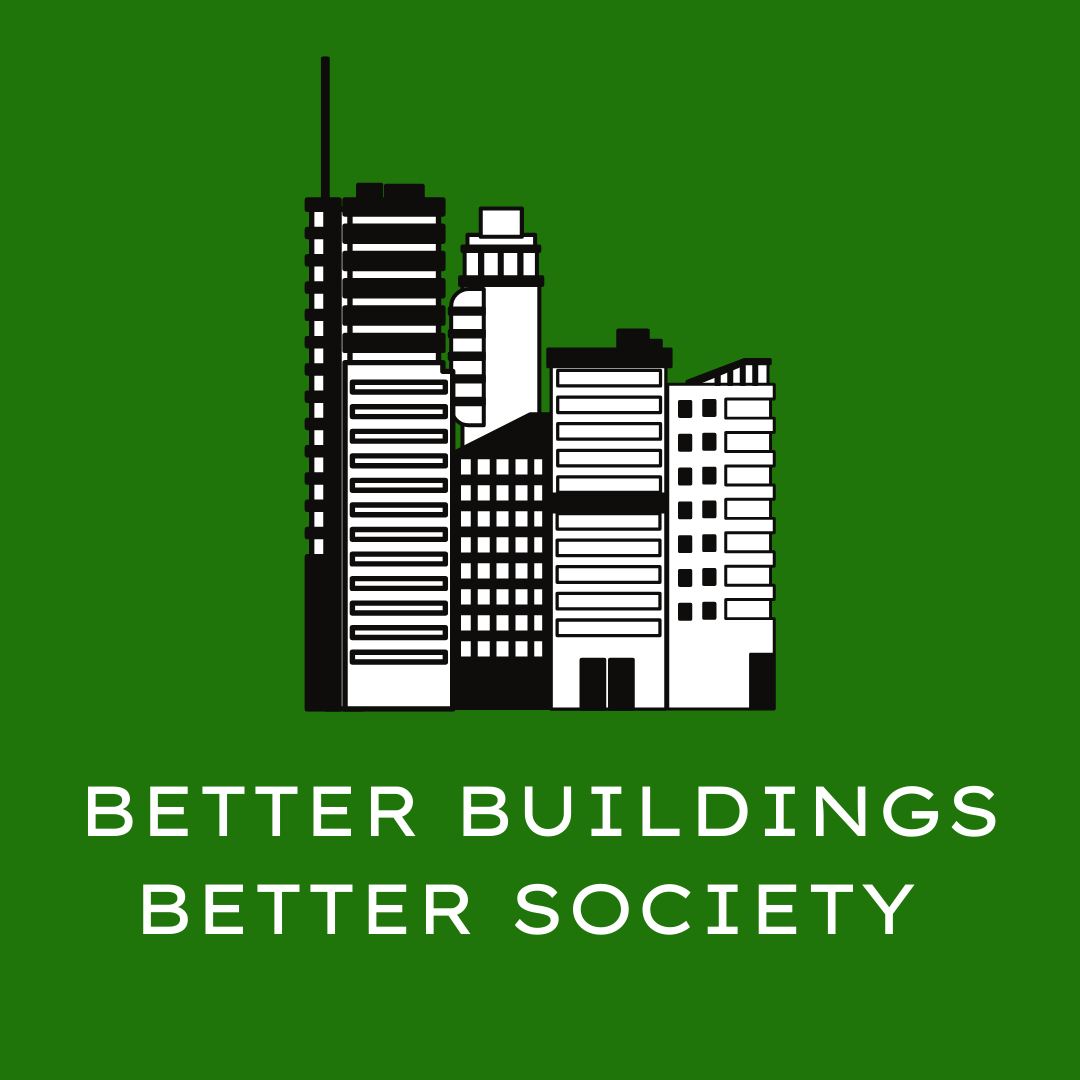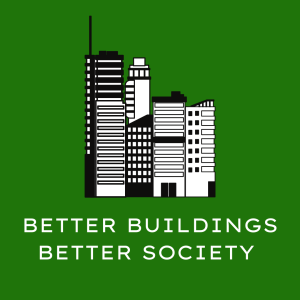
402
Downloads
13
Episodes
How can we make buildings better members of society? At the intersection of environmental awareness, entrepreneurship, and engineering, Steven Forrester (PE, BEMP BCxP CGD LEED AP BD+C, Passive House Designer) and expert guests explore this fascinating question and engage listeners with conversations that range from design and engineering to building operations and maintenance. We will learn more about the people, products, and newsworthy issues in our industry. Join us twice a month for conversations about the built environment!
Episodes

Friday Apr 22, 2022
We’re Not All Elon Musk
Friday Apr 22, 2022
Friday Apr 22, 2022
“We're not all Elon Musk in terms of our impact on the world, but we can at least adopt the things that move the world in the right direction to minimize our carbon footprint,” says Graham Swett, Residential Architect and Associate at KGA Studio Architects. With over 40 years of building experience, Graham has seen first-hand the changes to the architectural industry. He notes that changes are being made for the better in regards to environmental impact and safety.
Minimizing our carbon footprint anywhere we can is good for everyone. With the creation of the International Energy Conservation Codes, changes were implemented to make buildings more energy efficient. When buildings are built with tighter codes, there is less environmental impact. When the public is more educated and demands buildings be held to higher standards, that is when we see the greatest push for improvements.
Tune into this week’s episode of Better Buildings, Better Society for a conversation with Graham and Steven about energy-efficient buildings. Learn more about the changes Graham has observed over the past 40 years working in residential architecture, how the International Energy Conservation codes came about, and how to build better buildings with less environmental impact.
Quotes
• “Whenever we can minimize our footprint when it comes to utilizing energy, it is good for everybody.” (3:17-3:23)
• “We're not all Elon Musk in terms of our impact on the world, but we can at least adopt the things that move the world in the right direction to minimize our carbon footprint.” (4:08-4:22)
• “Build tight. Ventilate right.” (14:21-14:23)
• “Our codes are getting tighter and people are building better buildings.” (19:03-19:08)
• “We should be spending a lot more time upfront analyzing and understanding what the decisions we're making are doing and how they're impacting the long term performance of the project.” (32:36-32:50)
• “Never abandon what you already know because of somebody else telling you it's okay.” (42:52-43:01)
• “Having an educated buying public that knows what they should be asking for will drive what our building environment starts to look like because if the demand is there, it'll get built.” (47:30-47:50)
Links
https://kgarch.com/team/graham-swett
Learn more about Better Buildings, Better Society:
Website | https://www.dma-eng.com/
LinkedIn | https://www.linkedin.com/company/dma-engineering/
Steven’s Personal LinkedIn | https://www.linkedin.com/in/steven-forrester-36a91517/
Instagram | https://www.instagram.com/dma_engineering/

Wednesday Feb 09, 2022
The Power of a Hair Dryer
Wednesday Feb 09, 2022
Wednesday Feb 09, 2022
“All the sub-niches are really our focus. We are all about having products or providing products that help us achieve much better energy efficiency,” says Todd Collins, Founder of AE Building System. Starting his career in technology, Todd had the concept of passive solar design in the back of his mind. After completing his Passive House training, Todd now works to provide energy-efficient products that set up future generations for a positive environmental future.
Todd explains the reasons why the population is moving toward the Passive House design. Besides many municipalities now moving toward a Zero-Energy Ready direction, many others also realize that energy-efficient homes are quieter, more comfortable, and longer-lasting in addition to environmentally friendly. With building codes improving over time, Todd recognizes there's a real opportunity for our society to move in a better direction for generations to come.
Tune into this week’s episode of Better Buildings, Better Society for a conversation with Todd and Steven about passive solar design. Learn more about Todd’s start in the solar industry, Passive Houses' environmental and quality benefits, and his advice to those considering buying and building a home for the first time.
Quotes
• “All the sub-niches are really our focus. We're all about having products or providing products that help us achieve much better energy efficiency.” (6:18 - 6:30)
• “Code is getting better in general. But the real opportunity is about setting our future generations up in a positive way.” (6:43 - 6:58)
• “There are most certainly altruistic people out there that say, ‘Hey, this is what we should do, it's the right thing to do, and we're going to do it. It's going to cost more, but we're going to do it anyway.’ And then they can justify it with, ‘I want a more comfortable house, a quieter house, better indoor air quality, and a house that lasts forever so that I can give it to my kids, and they can live in it forever.’ So you throw in the other benefits and you've got a really good value proposition.” (17:52 - 18:18)
• “They're doing what's referred to as this step code. They're making incremental steps towards a much higher performance requirement.” (19:52 - 19:59)
• “The five principles are relevant no matter whether you go for a certified Passive House or not. It's for building a house, it's going to last for a very long time, and it's giving us less energy. So we have a lot of clients that leverage the concepts, but don't necessarily go the entire distance.” (28:22 - 28:45)
• “We're resilient from a different standpoint. You have the resilience of the envelope because it’s designed correctly. So, you've got resilience and the durability and longevity of the building itself that’s resilient in its own way. And then you look at energy prices, and you're basically hedging today's construction costs against tomorrow's operating costs.” (41:27 - 41:55)
Links
Learn more about Todd Collins:
Company Website | https://aebuildingsystems.com/
Company LinkedIn | https://www.linkedin.com/company/a&e-building-systems/
Personal LinkedIn | https://www.linkedin.com/in/todd-collins-a5ba778/
Learn more about Better Buildings, Better Society:
Website | https://www.dma-eng.com/
LinkedIn | https://www.linkedin.com/company/dma-engineering/
Steven’s Personal LinkedIn | https://www.linkedin.com/in/steven-forrester-36a91517/
Instagram | https://www.instagram.com/dma_engineering/
Podcast production and show notes provided by HiveCast.fm

Tuesday Jan 11, 2022
Endless Opportunities and Education
Tuesday Jan 11, 2022
Tuesday Jan 11, 2022
“It was back in the 80s when I started learning about thermal solar because it just made sense to try to draw power sources from places that weren't traditional,” says Phil Jensen, Co-Owner of Sensible Heating and Cooling. Phil started his engineering career in the 80s with thermal solar and soon transitioned into working on traditional HVAC systems. His time working on thermal solar created the foundation of his passion for energy efficiency and the need to move towards energy conservation in buildings.
Phil explains the growing crisis of lack of interest in the mechanical engineering field, specifically from younger generations. He explains that younger generations aren’t aware of the large spectrum of jobs available to them with a mechanical engineering degree. Not every mechanical position defaults to an office job, and Phil shares that his own role in mechanical contracting always keeps him engaged and on his toes.
Tune into the premiere episode of Better Buildings, Better Society for a conversation with Phil Jensen about energy efficiency. Learn more about Phil’s advice to his younger self, the benefit of integrating household systems, and the importance of educating your customers on the benefits of your products.
Quotes
• “Well, as far as the labor goes, I think, as an industry, what I've seen is we've done just a terrible job of recruiting people and getting them interested in this industry.” (06:05-06:14)
• “It was back in the 80s when I started learning about thermal solar because it just made sense to try to draw power sources from places that weren't traditional.” (14:19-14:32)
• “Thinking of the building itself as a system is really important.” (19:43-19:46)
• “It's been really interesting talking to potential customers because when they talk to my competitors, my competitors are always trying to downgrade the value of the heat pump system. So, I think what's really interesting about that is just trying to educate people about how to integrate all the systems in their house and not look at them as separate things.” (22:10-22:34)
• “Really pay attention and do some investigation, especially on existing buildings, you know, do some investigation and figure out what was there before you start doing anything.” (36:41-36:48)
Links
Sensible Heating
Website | https://sensibleheat.net/
LinkedIn | https://www.linkedin.com/company/sensible-heating-cooling/
Phil Jensen’s LinkedIn | https://www.linkedin.com/in/philjensen/
Learn more about Better Buildings, Better Society:
Website | https://www.dma-eng.com/
LinkedIn | https://www.linkedin.com/company/dma-engineering/
Steven’s Personal LinkedIn | https://www.linkedin.com/in/steven-forrester-36a91517/
Instagram | https://www.instagram.com/dma_engineering/
